The Bones of Home
Into the Creative Process of 'De thír mo Mháithreacha'
An audio recording is included as an invitation to experience the sacredness held within the voice (and tradition) of oral storytelling. If it resonates, please enjoy at your leisure - maybe curled up with a warm cuppa tea or held within the wild embrace of the magical natural world that surrounds you.
Mo ghrá go léir / All my love,
Erica
An Introduction to the Series
**For individuals who prefer to read W&E entries - I invite you to experience my rendition of ‘Galway Bay’ before continuing [it’s also included at the end of the full audio recording at 14:25 - linked above]**
Over the next year, a part of my creative path is dedicated to bringing Into the Circle Theatre’s next full-length sacred story into being.
When opening the space for theatrical gatherings, I often say:
… to know who you are and where you are going, it helps to know where you come from.
This is the root system of our next story.
Explored from the perspective of a daughter of the Irish diaspora, De thír mo Mháithreacha: Of the Land of My Mothers weaves a tale of Irish identity and finding a sense of home upon lands that aren’t of one’s blood and bone.
Two tales told in tandem, including a personal story of navigating cultural identity as a modern day Irish-Canadian woman, and a story of an Irish emigrant arriving in Bytown/Ottawa during An Gorta Mór [The Great Famine], De thír mo Mháithreacha: Of the Land of My Mothers takes audiences on a journey of remembering that wherever your feet may roam, you are always connected to home.
While told through the lens of Irish diasporic grief, this tale is for all souls who are seeking the songs, the stories, and the lands of those who came before them.
Dancing between the realms of the physical, spiritual, and celestial, De thír mo Mháithreacha: Of the Land of My Mothers offers the invitation that we are all delicately woven within the tapestry of liminal space threaded by modern and historical time.
Consider this series a ‘behind the scenes look’ into the creative process.
I invite you to journey with me, as my wanderings, wonderings, and insights find their place upon the page.
How do we begin to grieve generations of separation from ancestral homeland?
How do we find a connection to home if we were born upon lands that are not of our blood and bone?
At this point in my journey, I feel the answer is we start with the landscape of our body.
Through the Bones of Grief
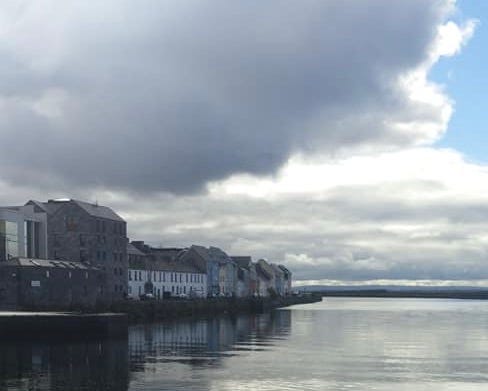
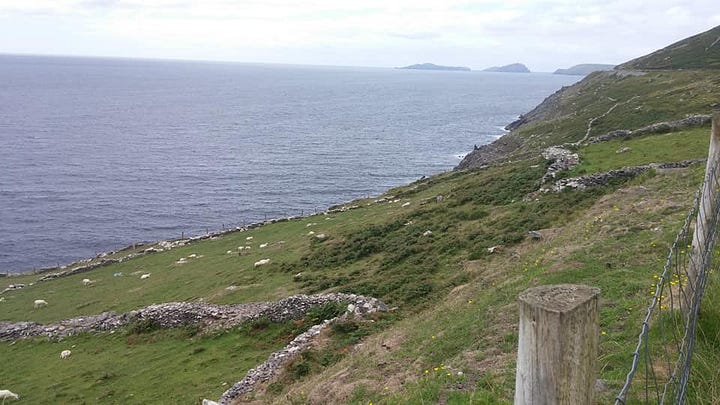
My body knows the call Of the gulls Upon her wild Western coast My body knows her Rolling hills And her wandering, winding Roads My body knows the colorful Homes that dance along Galway’s shores My body knows that young boy Alone; staring up At that tall stone door
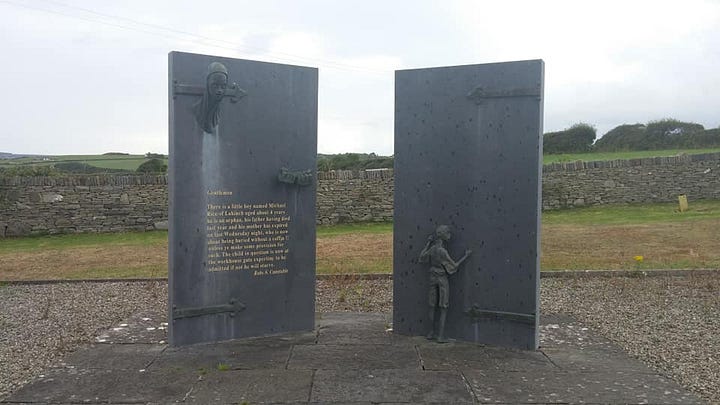

My body knows the ghosts
In my bones;
Who sailed from
Gratton Beach
My body know the wail
Of the uilleann pipes
That haunted me in theatre seats
My body knows.
My body knows.
My body knows.
She’s calling me home.
My body knows where I belong.
My body knows the landscape of home.
For it's rooted in my bones.
But,
I was born here.
Not there.
On lands across the Atlantic sea.
And yet,
She calls to me.
Reminding me that regardless
Of where I was planted
I am never alone.
For, wherever I roam.
She's the landscape of my marrow.
And in the soil beneath my feet.
She’s always been here - and there.
She's everywhere.
Ever ready,
Patiently waiting,
To welcome her
Daughter back home.
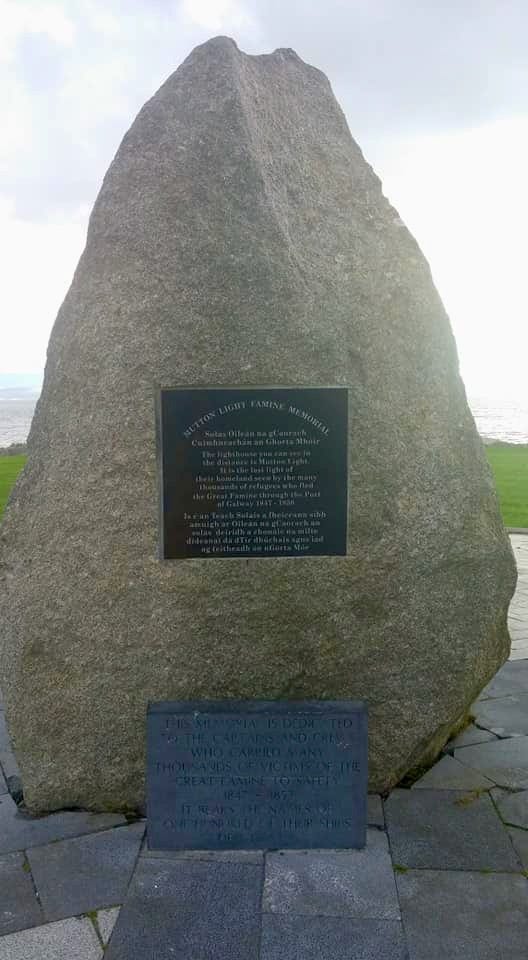
Diasporic Grief: What Does it Mean?
There is a grief, a very particular grief, inherent to being neither of the land you were raised in (the land your family settled in) but also not being fully accepted by the place your bones call home.
Dr. Belinda Vigors. Diaspora Grief. The Women of Ireland Project.
I am not a historian and I am not a scholar.
I come to the altar of this work with an artist’s heart and my personal somatic experiences.
Defining the vastness and the intricacies of the term diasporic grief is something that we’ll continue to circle back to throughout this series.
To start, let us consider its parts.
Etymonline defines the two terms as:
diaspora (n.) - “… from Greek diaspora ‘dispersion’ from diaspeirein "to scatter about, disperse” from dia “about, across” + speirein “to scatter”.1
grief (n.) - “… ‘hardship, suffering, pain, bodily affliction,’ from Old French grief "wrong, grievance, injustice, misfortune, calamity" (13c.), from grever "afflict, burden, oppress," from Latin gravare "make heavy…”2
And while the independent definitions may suffice, they don’t capture the somatic experience I had in a Galway when I heard the uilleann pipes for the first time.3
However, the reflections of Dr.
’ strike a deeper chord with me.Throughout the article titled Diaspora Grief, Vigors’ tangibly describes the internal experience of something that I’ve long known - but struggled to define.
Diaspora Grief:
The inexplicable and overriding sense of loss and mental anguish you feel for the place the marrow of your bones yearn for
Dr. Belinda Vigors. Diaspora Grief. The Women of Ireland Project.
One particular Women of Ireland Project participant, named Amelia, shared an aspect of diasporic grief that really resonated with me (especially being of settler heritage, living in Canada):
“I am very fascinated by the presence and the absence… and there is something to be said for the absence; you need to fill it…. It seems like a lot of us in the US who are not Native American feel this. We know our bones are not from that land…. we aren't on the lands that our bones are from…. I still need to get better at describing the presence and the absence, but like you can only describe how Ireland feels by also knowing what it feels like to not have Ireland in the United States.
Which is; it's an emptiness there's a disconnection and a silence, a fuzziness, like someone put noise cancelling headphones on your ears…. We have a totally different relationship to the land [of Ireland], because we have been removed from it. And it feels like, what is the syndrome? Like phantom limb, where it's like you lose the limb but you still feel it.”
Reading experiences such as these, I know I am not alone in trying to find my way home - and that this is a story needing to be told.
Can we please count everyone, who is part of our diaspora as Irish? If they come home, it might have taken them four generations, but they made it back. Because I'm sure when they left. I mean, the families must have known, they weren't going to see them again. But there must have been that glimmer of hope of maybe they'll come back.
Jean, Women of Ireland Project Participant. Diaspora Grief.
Standing at the edge of the well She dips a chalice Bronzed and gold Into her waters She offers the cup And tells me to drink I do, and I soften even more Into myself Soon, Hovering above the opening I find myself Descending Deeper and deeper Into the womb of Of Her Earth As I travel, Burrowed within the dirt, Off shoots from my path, Rest parallel tunnels of light People buried within The grief and sorrow Held within The hollowed bone Of Her What's within the wells of the grief in my body? What's within the wells of grief in the collective body? What's within the wells of grief of the land Herself? The answer dwells here. Where the Land Speaks (Part 1): Homecoming to the Land of Éire
Remedy through Rootedness
If diasporic grief is the felt sense of loss experienced through the separation from homelands. Then maybe the remedy (especially in our modern day) is ancestral connection?
Maybe the remedy is found in calling their names, speaking their language, sharing their stories, and singing their songs?
When you’re feeling homesick, what do you reach for? The comforts of home.
When you feel lost, place your trust
in the Mothers;
Claim her names in Her ancient tongue;
Reach your arms towards Her heavens and stars;
Rest your head upon Her breast;
Feel your feet upon Her earth;
And know that you are home.
De thír mo mháithracha: Of the Land of My Mothers is about finding and feeling your way home through the landscape of your body.
Culture roots connection. Connection soothes separation.
Songs connect us;
Language connect us;
Stories connect us;
To landscape of our physical and spiritual bodies that are rooted to our ancestral homelands.
Echoes of our Ancestors
During the creation and development of De thír mo Mháithreacha: Of the Land of My Mothers, my intention is to learn some of the Irish language - through phrases and songs. For the stories, the poetry, and the songs of an Gaeilge are alive.
I feel this is one way we can tend to (what feels like) untethered roots.
When we connect to our ancestral homeland through the heart of her language, ‘home’ is now tangible.
You can hear her. You can feel her. She’s real. She’s right here.
As a daughter of the Irish diaspora, I believe in leaning into the stories and songs of glory and grief that rest within my bones. I believe this is where the medicine for the yearning heart resides.
Recently, I learnt a song that calls to my spirit. And while it was made popular in the late 1940s, its humble roots are what strum at my heart-strings.
Galway Bay was originally composed by Enniskellan-born Arthur Coholan (b. 1884), who was raised and later studied medicine in Galway. However, after World War I and serving with the Royal Army Medical Corps, he would later place roots in Leicester, England - where he would spend the remainder of his life.4
Personally, Coholan’s ability to weave melody alongside nostalgic imagery of Ireland elicits an immediate desire be there - especially with a personal connection to Galway.
When I hear this song, I want to watch the sunset from Galway Bay. I want to hear the trout stream. I want to feel the breeze on my face and hear the heather in the fields.
But, when I sing the song something mystical happens.
When I open my voice to Galway Bay, it feels as though I’m inviting my ancestors who emigrated from Ireland throughout 1800s to step forward.
When I open my heart to Galway Bay, my body becomes a channel to listen in a new way.
The song then becomes a communion or conversation with my ancestors, as I ask them:
Tell me the stories of your love-filled memories of home. Tell me the stories of your sorrows of leaving her. Tell me your stories so that I may honour you. Tell me your stories so that I may better understand the grief that dwells within me - to be of two places and rooted no where, at once. Tell me your stories so that I may know what it means to find home while living upon lands that aren't of my blood and bone.
And they do.
All of a sudden, it’s not only my voice. It’s our voice. For, I am of their blood and bones.
They stand with me in those moments; although they rest across the veil. I can feel their physical presence beside me. And I know it’s real because my body affirms what I know through chills and goosebumps - that dissolve with the song’s ending.
Diasporic grief is real. It dwells within the landscape of our bodies.
However, I also believe that when we tune into the wisdom of our body linear time and space dissolve; and it’s here, where we can sooth the grieving parts of our soul while also finding our way home.
Being of Irish and French ancestry, I continue to be reverently grateful to the traditional spirits and keepers of the land [past, present, and forth-coming] of the unceded and unsurrendered territory of the Algonquin Anishinabeg People; where I was born and currently reside.
Culture, language, and stories run within the rivers and are held within the stones of landscapes. Míle buíochas, a thousand thanks, for the opportunity to live, create, share stories, and walk alongside you.
I would love for Weavings of the Wise & Embodied to be an opportunity for us to connect in shared story. A homecoming of souls around the hearth, held within this sacred liminal space.
Please feel welcome to share by leaving a comment below. It would be wonderful to hear from you.
Until we meet in circle again, may grace and ease continue to find you.
Le dea ghuí / With good wishes,
Erica
Interested in more information on 1:1 supportive offerings or Erica’s approach to sacred storytelling?
Please visit Into the Circle with Erica O’Reilly for more information.
If this is your first experience held within our corner of the Substack realm, I would love for you to continue the journey with us - and invite a friend to come along as well!
Where the Land Speaks (Part 1): Homecoming to the Land of Éire. Weavings of the Wise and Embodied [Substack].
Freeman, Norman. Something to sing about – An Irishman’s Diary on ‘Galway Bay’. Irish Times. September 21, 2017.


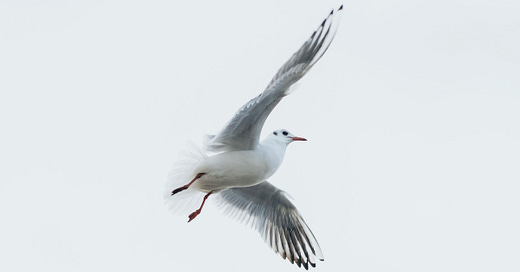












This piece was such a necessary read. A mirror of all the things hidden and shadowed. I'm from Hawaii and I am part of the economic diaspora living on Turtle island, Michigan. I'm a Native practitioner and being a land based society, land as family, throws me in unsteady seas. I find myself in a canoe what feels like a vast ocean with the luminaries as my only companion of navigating and groundedness. My eyes are attuned to blue oceans, tall green mountains the color and scent of sand.
The language spoken and the light in the eyes of my community, are missing from me.
To hear my named called as a reclamation a belonging to, the experience of a village and rooted heritage.
To mourn the lost of a loved one is in equally parts guilt and grief. Having nowhere just yet a place to hold my sacred tears to be held by familiar sacred spaces that knows me, by name.
I'm a storyteller and write poetry in my head. I founded an organization to address this very longing. Www.pikomi.org PIKO is belly button in Hawaiian also meaning a connection to. That is yhe acronym reminding us to return to our roots for nourishment and healing.
I feel all of this so deeply. I’m almost fully Celtic blood, with a small bit of native Turtle Island.blood. I have longed for Ireland as long as I can remember. I was blessed to travel there for five weeks back in 2019. I didn’t get down to Munster but my time in Donegal and especially Connemara and Achill Island reverberated deeply inside me. I don’t have a mind’s eye (aphantasia) but when I stood there, I folded the wind, the coolness of the air, the craggy rocks and hills, the Atlantic Ocean, deep into my being and when I think about it, I can’t see it in my mind, but I feel it in my body and know, in some way, I am still there and I always will be there.
Maybe we could do something together in the future. In a previous life during the current life, I was married to a Rabbi and trained as a maggid (story teller) and am also a poet! Diasporic Sisters?